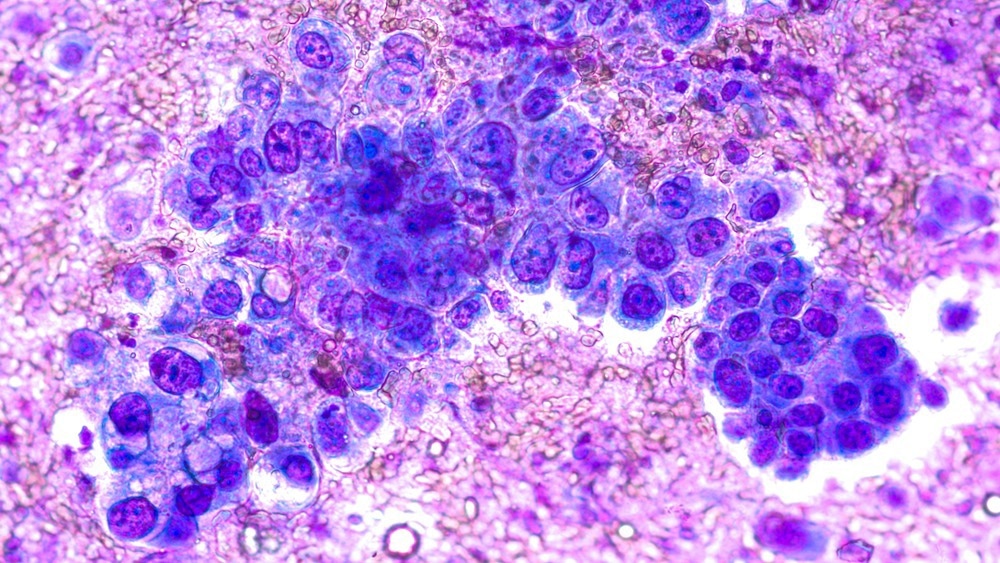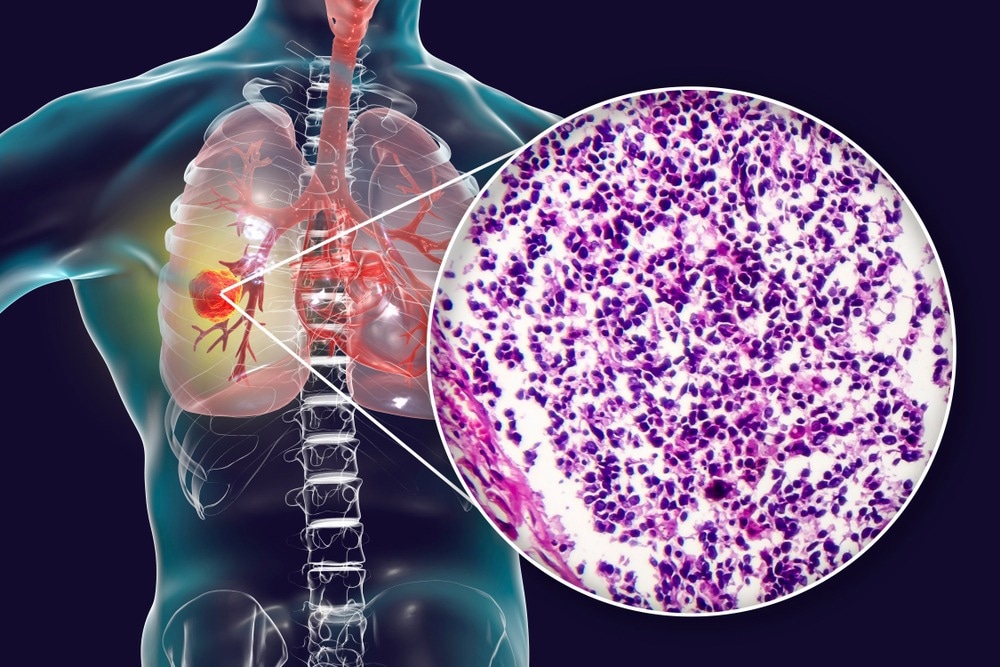Introduction
Non-small cell lung cancer survival rate
Stage 1
Stage 2
Stage 3
Stage 4
Small cell lung cancer survival rate
Stage 1
Stage 2
Stage 3
Stage 4
References
There are many different types of lung cancer, but the two main types are small cell lung cancer (SCLC) and non-small cell lung cancer (NSCLC). About 15% of lung cancers are SCLC, while 85% are NSCLC.
SCLC grows quickly and has often already reached an advanced stage when diagnosed. NSCLC, on the other hand, is more slow growing and may be diagnosed at a stage when it can be surgically removed. The outlook after treatment for patients with these forms of lung cancer is described below.

Image Credit: David A Litman/Shutterstock.com
Non-small cell lung cancer survival rate
There are four main stages of lung cancer, and in 2007, a study called the Lung Cancer Staging Project gathered data for 81,000 lung cancer patients and gave survival statistics for people with different stages of NSCLC. The cancer is further divided into stages A and B for each stage.
Stage 1
This first stage of the disease is associated with the best treatment outcome because it is often possible to remove stage 1 tumors surgically. Between 59% and 73% of people with stage 1A will survive for at least five years after diagnosis, while for those with stage 1B, the figure is between 43% and 58%.
Stage 2
For stage 2A, it is projected that 36-46% will survive for at least five years or more after diagnosis if they receive treatment, while for stage 2 B, this figure is between 25% and 36%.
Stage 3
The survival statistics start to fall with more advanced stages of lung cancer. For stage 3A, the five-year survival rate after diagnosis is between 19% and 24%, while for those with stage 3B, the figure is 7% to 9%.
Stage 4
This is the most advanced stage of lung cancer when the cancer has spread beyond the lung to other body parts. The survival statistics for stage 4 lung cancer are very low. For individuals with stage 4 disease, only between 2 and 13% will survive for at least five years after diagnosis.
Small cell lung cancer survival rate
Small cell lung cancer is sometimes divided into two groups: limited disease, which describes cancer that has not yet spread beyond the lung, and extensive disease, where the cancer has spread beyond the lung.
Around 30% of people diagnosed with small cell lung cancer have limited disease when the cancer is diagnosed; with treatment, around one-quarter of those will survive for at least two years. Two-thirds of small cell lung cancer individuals already have extensive disease when their condition is diagnosed. The chances of survival are low; even with treatment, less than 5% survive for at least five years after diagnosis.
Below are survival statistics generated by the Lung Cancer Staging Project based on stage for 8,000 patients with small cell lung cancer.

Image Credit: Kateryna Kon/Shutterstock.com
Stage 1
Of patients diagnosed with stage 1A, 40% will survive for at least five years after diagnosis, while for those with stage 1B, the figure is 20%.
Stage 2
Of patients diagnosed with stage 2A, around 40% will survive for at least five years after diagnosis, while for those diagnosed with stage 2B, the figure is 20%.
Stage 3
Again, at this stage, the survival statistics are less optimistic. For stage 3A, the percentage of patients who will survive for at least five years after diagnosis is 15%, while for stage 3B, the figure is 10%.
Stage 4
Here, the cancer has already spread beyond the lung to other parts of the body. Since lung cancer tends only to get diagnosed in the late stages, unfortunately, the cancer has often already spread at the time of diagnosis. Only around 1% of people with stage 4 disease will survive for at least five years after diagnosis.
What Is The Life Expectancy Of Lung Cancer? | Lung Foundation Australia
References:
- british lung foundation (2015). What Is Lung cancer? - British Lung Foundation. [online] British Lung Foundation. Available at: https://www.blf.org.uk/support-for-you/lung-cancer/what-is-it.
- Mayo Clinic Staff (2018). Lung cancer - Diagnosis and treatment - Mayo Clinic. [online] Mayoclinic.org. Available at: https://www.mayoclinic.org/diseases-conditions/lung-cancer/diagnosis-treatment/drc-20374627.
- www.cancerresearchuk.org. (n.d.). Survival | Lung cancer | Cancer Research UK. [online] Available at: https://www.cancerresearchuk.org/about-cancer/lung-cancer/survival#nonsmall [Accessed 1 Aug. 2022].
Further Reading
Last Updated: Aug 10, 2022